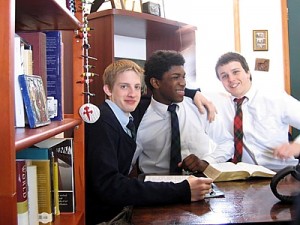
Daily life at Gregory the Great is a careful balance of prayer, work, and play, which provides a dynamic structure for boys to grow. Throughout life at GGA students are given the chance to participate in a wide range of wholesome activities such as athletics, the academy juggling troupe, symposiums, talent shows, concerts, dramatic performances, local community services, and both cultural and liturgical celebrations. These activities are not thought of as “extra-curricular” but absolutely a part of the student formation. They provide a balance between the rigors of academic study and physical work.
Scripture tells us that Wisdom was with God from the beginning, playing in his presence and in the world. From this we see that play is not to be dismissed as a frivolity, but is central to wisdom, the highest goal of education. A well established virtue, even intellectual virtue, is characterized not by strain, but by the ease, virtuosity, and freedom of play. Education should aim for this virtuosity, and even anticipate it just as we practice in order to play well in a game. At Gregory the Great Academy we take play seriously, and strive always to rejoice with charity in the good things God gives us.
 Gregory the Great Academy promotes an environment of technological poverty. Students are not permitted the use of television, music players, personal computers, cell phones, or other electronic devices. Our boys do have some limited computer access to fill out college applications, book flights home, or receive other important communication. Community telephones are available for student use. Community music players are also used and controlled by the staff. This policy frees our students from the distractions of the modern world and promotes a freedom that enhances the development of their imagination.
Gregory the Great Academy promotes an environment of technological poverty. Students are not permitted the use of television, music players, personal computers, cell phones, or other electronic devices. Our boys do have some limited computer access to fill out college applications, book flights home, or receive other important communication. Community telephones are available for student use. Community music players are also used and controlled by the staff. This policy frees our students from the distractions of the modern world and promotes a freedom that enhances the development of their imagination.
Furthermore, the this environment promotes the cultivation of good friendships, and the contemplation of the Divine. C.S. Lewis, in The Abolition of Man, argues that in modernity:
“there is something which unites magic and applied science [technology] while separating them from the “wisdom” of earlier ages. For wise men of old, the cardinal problem of human life was how to conform the soul to objective reality, and the solution was wisdom, self-discipline, and virtue. For the modern, the cardinal problem is how to conform reality to the wishes of man, and the solution is a technique.”
Such preoccupation with technological advancement greatly inhibits the search for the true, the good, and the beautiful.